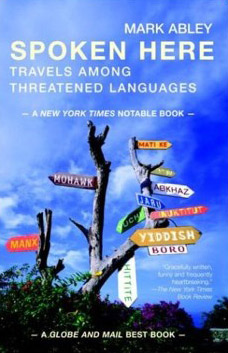Spoken Here: Travels Among Threatened Languages
 Houghton Mifflin (2003)
Houghton Mifflin (2003)
Random House of Canada (2003)
William Heinemann (2004)
Shortlisted for the Pearson Writers’ Trust Non-Fiction Prize, 2004
Shortlisted for the Grand Prix du Livre de Montréal, 2003
A New York Times Notable Book
A Globe and Mail Best Book
A San Francisco Chronicle Best Book
“Riveting … Abley seems to have been everywhere and spoken to everyone … Learned, thought-provoking, bouncing with ideas, yet funny and wry. Abley’s passion for his subjects is inspiring.”
— The Independent
“Spoken Here is a splendid, original work, written with a combination of the scholarly and the personal, the anecdotal and the researched, in voices that celebrate words.”
— The Globe and Mail
“A fascinating and addictive book. It is more than that: it is a lucid, often eloquent journey through the crumbling linguistic foundations of humanity.”
— Daily Telegraph
“Gracefully written, funny and frequently heartbreaking.”
— New York Times
“A joy … If you instinctively inveigh against blandness and uniformity, this is an essential read.”
— The Guardian
“In showing us the joys of linguistic diversity, Abley scatters irresistible diamonds.”
— Chicago Sun-Times
“A cri de coeur, passionately and convincingly argued … Vivid and often funny … So well-written and lively. Spoken Here should help to extricate this subject from the academic circles to which it has mostly been confiined, and get it out into the wider world.”
— New Statesman
“Spoken Here is a mix of travelogue, history, linguistics, journalism and finally agitprop on behalf of Babel … Books may be almost routinely described as ‘important,’ but Mark Abley’s Spoken Here truly is.”
— Sunday Herald (Glasgow)
This book has been translated into French (by the distinguished novelist Dominique Fortier), Spanish, Japanese and Latvian. It continues to find readers many years after publication. The issues explored in the book — about the meanings of language loss, globalization and cultural uniformity — have, alas, not disappeared.
An excerpt from Spoken Here:
There was one more topic I had to broach. I was almost dreading it.
“And do you use Provençal in your daily life?”
“Of course,” he said to my surprise. “But less and less. And partly it’s because I find the words are missing. I speak Provençal to a certain extent when I go into a village. Sometimes there are meetings where I use it. But mostly, I speak it at funerals. The women gather together in one group, the men in another, and we speak in Provençal. The men talk about the harvest and they talk about hunting. It’s curious — at that moment you feel the weight of tradition, and the tradition rises up again. At funerals, something leads us to speak spontaneously in Provençal.”
Bec and his black setter walked out into the warm afternoon to see me off. He urged me to take care on the winding lane back to the main road. I waved goodbye, but I hardly saw the man any longer. There was a vision in my mind that refused to go away: a little crowd of people, most of them even older than the priest, who stand on the high steps outside a medieval church and gaze down toward the vineyards and olive groves of a gray-green valley. Their ears still ring with the music of departure — peace, eternal rest, perpetual light — and their minds are restless with the past.
There, in that field, the dead one used to go courting; that was the grove struck by lightning in the great storm … But a horn sounds in the distance, and the people in the crowd become aware that they’re not as strong as they would like: after a time, the complaining muscles and veins and bladders require them to move. As they shuffle down the church steps, taking precautions not to fall, they bid farewell to each other one more time in the language of their youth; they bid farewell to the language of their youth.
